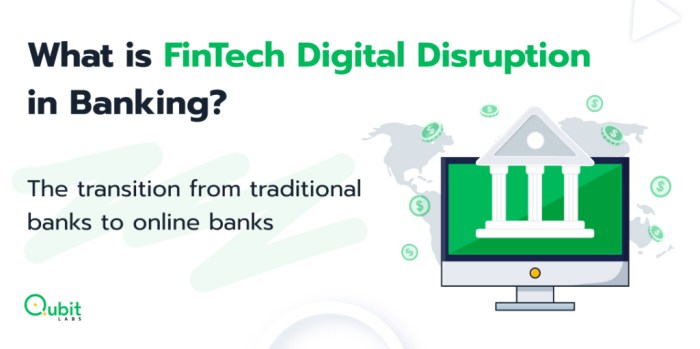Exploring Fintech Market Disruption
Diving into the world of fintech market disruption, where innovative technologies are reshaping the financial landscape as we know it. From blockchain to artificial intelligence, this phenomenon is revolutionizing traditional financial institutions and paving the way for a new era of finance.
Overview of Fintech Market Disruption

Fintech market disruption refers to the innovative use of technology to transform and improve financial services, challenging traditional financial institutions. This disruption has changed the way consumers access financial services, manage their money, and make transactions.
Impact on Traditional Financial Institutions
Traditional financial institutions are facing significant challenges due to fintech market disruption. They are forced to adapt to the changing landscape, improve their digital offerings, and provide more personalized services to compete with fintech companies. This disruption has also increased competition, leading to a shift in the balance of power within the financial industry.
Key Players Driving Fintech Market Disruption
- Fintech startups: Companies like Square, Robinhood, and Stripe are disrupting the market with innovative solutions in payments, investing, and banking.
- Big tech firms: Tech giants such as Google, Amazon, and Apple are entering the financial space, offering services like digital wallets, payment solutions, and lending platforms.
- Blockchain companies: Blockchain technology has revolutionized the way transactions are conducted, with companies like Ripple and Ethereum leading the way in disrupting traditional payment systems.
Challenges Faced by Traditional Financial Institutions
- Legacy systems: Traditional financial institutions often struggle to integrate new technologies into their existing infrastructure, leading to inefficiencies and higher costs.
- Regulatory hurdles: Fintech companies operate in a less regulated environment compared to traditional institutions, giving them a competitive advantage but also raising concerns about consumer protection and financial stability.
- Customer expectations: Consumers are increasingly demanding seamless digital experiences, forcing traditional institutions to invest in technology to meet these expectations and retain customers.
Technologies Driving Fintech Market Disruption
Blockchain technology, artificial intelligence, big data, analytics, and cybersecurity are key drivers reshaping the fintech landscape.
Role of Blockchain Technology
Blockchain technology revolutionizes transactions by providing a decentralized, secure, and transparent platform. It eliminates intermediaries, reduces costs, and ensures trust through immutable ledgers.
Impact of Artificial Intelligence
Artificial intelligence enhances decision-making processes, automates tasks, and personalizes user experiences in fintech. AI algorithms analyze vast amounts of data to detect patterns, mitigate risks, and improve customer service.
Big Data and Analytics in Fintech
Big data and analytics enable fintech companies to extract valuable insights from large datasets. By leveraging data analytics, firms can enhance product offerings, optimize operations, and tailor services to meet customer needs effectively.
Significance of Cybersecurity
Cybersecurity is paramount in fintech to protect sensitive financial information, prevent data breaches, and maintain customer trust. Robust cybersecurity measures safeguard against cyber threats, ensuring the integrity and confidentiality of transactions.
Emerging Trends in Fintech Market Disruption
The fintech industry is constantly evolving, driven by emerging trends that shape the way financial services are delivered and consumed. Let's explore some of the latest trends influencing fintech market disruption.
Growth of Mobile Payments
Mobile payments have seen exponential growth in recent years, transforming the way consumers make transactions. With the widespread adoption of smartphones and the convenience they offer, mobile payments have become increasingly popular. This trend has pushed traditional financial institutions to innovate and adapt to the changing landscape of digital payments.
Rise of Decentralized Finance (DeFi)
Decentralized finance, or DeFi, has emerged as a disruptive force in the fintech industry. DeFi platforms leverage blockchain technology to offer financial services without the need for traditional intermediaries like banks
Adoption of Fintech Innovations
Fintech innovations like robo-advisors and peer-to-peer lending platforms have gained traction among consumers seeking alternative ways to manage their finances. Robo-advisors use algorithms to provide automated investment advice, making wealth management more accessible to a wider audience. Peer-to-peer lending platforms connect borrowers directly with lenders, bypassing traditional financial institutions.
These innovations are reshaping the financial services landscape and driving fintech market disruption.
Regulatory Challenges in Fintech Market Disruption

The regulatory landscape governing fintech companies and their disruptive technologies plays a crucial role in shaping the industry. As fintech companies introduce innovative solutions that challenge traditional financial institutions, regulators must adapt to ensure consumer protection, financial stability, and fair competition.
Potential Risks Associated with Regulatory Challenges
- Compliance Costs: Meeting regulatory requirements can be costly for fintech startups, especially those with limited resources.
- Legal Uncertainty: Rapid changes in regulations can create legal uncertainty for fintech companies, impacting their ability to plan and innovate.
- Market Entry Barriers: Complex regulatory frameworks can act as barriers to entry for new fintech disruptors, limiting competition and innovation.
Role of Compliance and Data Privacy Regulations
- Compliance Frameworks: Fintech companies must adhere to various compliance frameworks to ensure transparency, accountability, and trust with consumers.
- Data Protection: Stringent data privacy regulations safeguard consumer information and prevent data breaches, enhancing trust in fintech services.
- GDPR Compliance: Compliance with the General Data Protection Regulation (GDPR) is essential for fintech companies operating in the European Union to protect consumer data.
Impact of Regulatory Changes on Fintech Disruptors
- Adaptation Challenges: Fintech disruptors must constantly adapt to evolving regulatory changes, requiring resources and expertise in compliance.
- Market Dynamics: Regulatory changes can influence market dynamics, affecting the growth trajectory and investment landscape for fintech companies.
- Innovation Constraints: Overly restrictive regulations can stifle innovation in the fintech sector, limiting the development of groundbreaking technologies.
Last Word
In conclusion, fintech market disruption is a powerful force driving change in the financial industry. As new trends emerge and regulations evolve, the future of finance is being shaped by these disruptive innovations.
User Queries
What is fintech market disruption?
Fintech market disruption refers to the innovative technologies and approaches that are changing the traditional financial landscape.
How is blockchain technology impacting fintech market disruption?
Blockchain technology is revolutionizing the financial sector by providing secure and transparent ways to conduct transactions without the need for intermediaries.
What are some examples of key players driving fintech market disruption?
Companies like PayPal, Square, and Robinhood are among the key players driving fintech market disruption with their innovative financial services.
Why is cybersecurity significant in the context of fintech market disruption?
Cybersecurity is crucial in fintech market disruption to protect sensitive financial data and ensure secure transactions in an increasingly digital environment.